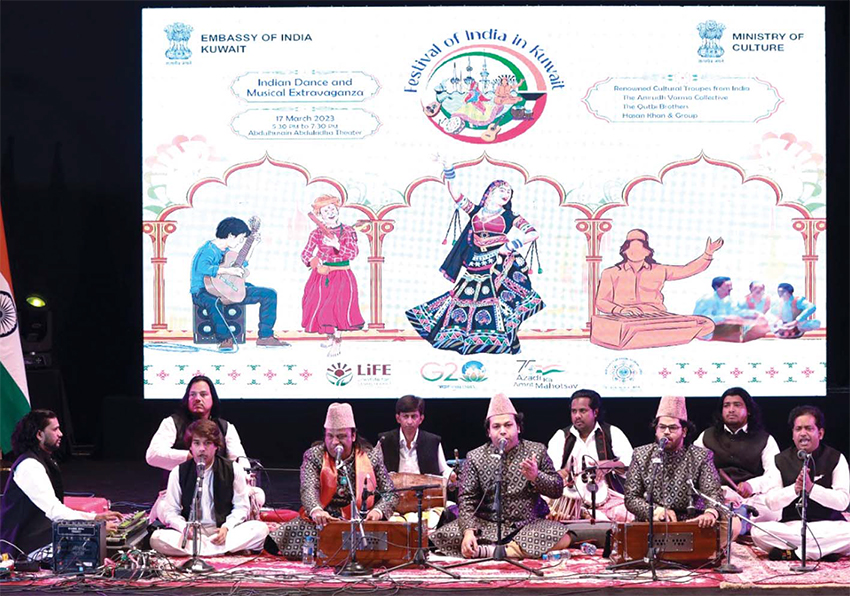28/03/2023
28/03/2023
‘Sufisaints bring people together. And so do the musicians and singers who sing Qawwali, an Indian localised form of Sufimusic,’ said Haji Mohammed Idris of the Qutbi Brothers, one of India’s most celebrated Qawwali singers who were in Kuwait recently for the Festival of India organised by the Embassy of India under the aegis of the Ministry of Culture, India. The Qutbi brothers are darbari singers at the shrine or mausoleum of Hazrat Qutbuddin Bakhtiyar Kaki at Mehrauli in Delhi.

“The dargah in Mehrauli teaches us to walk in unison and live in peace and harmony. During our annual festival, the Governor offers a covering of flowers on the shrine on the first day. The next day, a senior Muslim leader visits the nearby Hindu temple of Goddess Yogmaya and offers flowers to the deity. This festival, which takes place in October, has been going on since Emperor Bahadur Shah Zafar,” says Haji Mohammed Idris, who has been singing at the festival for more than four decades.
Popularity
Qawwali, like the Khyal, is one more offering that arose from Hindu – Islamic confluence in India and is a significant part of traditional Indian music. To the uninformed, ‘qawwali’ is a traditional form of Islamic singing. The appreciation of Qawwali requires musically tuned ears and a love for poetry. And if you have neither, just let yourself flow with the rhythm, which has engaged the interest of many Bollywood directors over the years. Despite having taken liberties with the pure form of Qawwali, Bollywood renditions such as ‘Shirdiwale Sai baba’ and ‘PardahaiParda’ from Amar Akbar Anthony, ‘Hum Kisi Se KamNahin’ from Hum Kisi Se Kam Nahin, ‘Aye Mere Zohrajabeen’ from Waqt have made a permanent place for themselves in the annals of classic Bollywood hits. They are remarkable examples of the secularization of this genre of music. ‘Qawwali affects the soul. Like Bhajan, it soothes the soul,’ shares Haji Mohammed, who is an exponent of the traditional form of the song.
Traditionally Qawwali rose in South Asia more than 700 years ago as a form of Sufidevotional music in parts of undivided North and North Western India. Performed at numerous dargahs/ tombs scattered across the Indian subcontinent, it gained popularity through the works of artists on both sides of the border.
According to a traditional qawwal, what sets the qawwal apart is the poetry or the lyrics and the desire to be true to oneself and the form of music. ‘Qawwali brings people together,’ says Haji Mohammed. ‘It is a musical offering of India, and like bhajan, it is intrinsic to the culture of Hindustan.’ There are three kinds of qawwali. ‘Qoullhamd -malikkishaanmein’ is praise of Allah/ God, ‘Sufibuzurgonkishaan me’ is a praise of the Saint and the ‘Ashiqana’ form of qawwali is a love song or a song praising the beloved.
To Haji Mohammed, a traditionalist, Qawalli is a message from God. Having inherited music from a long line of illustrious ancestors going back 800 years, Haji Mohammed gave in to his musical calling at the age of four. To many of their admirers, the Qutbi brother’s music is like a divine offering at the altar of love or God - two terms used interchangeably in Sufiana tradition. ‘It has not been an easy journey. I had to work and train very hard,’ notes Haji Mohammed, who earned the top grade level of artistry with All India Radio and became empanelled as an ‘Outstanding’ artist at ICCR and the Ministry of Culture. Qutbi brothers have great command over tradition. They have composed and sung the mystic verses of poets and wise men such as Baba Farid, Amir Khusrau, Meerabai, Rumi, BulleShah ,Kabir and many others.
Record
In 2019, they entered the Limca Book of World Records. ‘We are the world’s first qawwali singers who have created a world record for singing nonstop for 12 hours,’ says Haji Mohammed with pride. In their career spanning several decades, the much-awarded qawwals have enraptured audiences all over the world in several prestigious nationals and international festivals such as the Commonwealth Games India (SNA), Arth – A Culture Festival 2020, Under The Banyan Tree Baithak – on A Full Moon Night, Jahan-e-Khusro, Qutub Festival, AnhadNaad Festival (NCPA Mumbai), Sanskruti Arts Festival 2020 (Mumbai), Ek Bharat Shresth Bharat, Sikkim 2020, Gurgaon Utsav, International SufiFestival, Urdu Heritage Festival, Patna Maner Mahotsav, PhoolWalon Ki Sair, Jashn-e- Qawwali Festival among others.
Typically qawwali is performed in a group with the main vocalist or qawwal leading a group of supporting vocalists. It is a must for qawwali to be performed in a group, and the beauty of the form lies in the repetition of the lines while singing. Besides the harmonium, table, dholak, sarangi and rabab, clapping hands provide rhythmic support to the ensemble. One does have to be a Sufi, Muslim, Indian or of South Asian heritage to appreciate qawwali, as was evident at the Festival of India held in Kuwait. Although lyrics are very important, the rhythm of qawwali takes over, and as it escalates, it leads to an emotional climax. Music has no religion, says Haji Mohammed Idris.
The seven notes of Indian music are a way of connecting with the divine. Traditionally qawwali is linked to Sufism, a mystical school of Islamic thought that believes in spiritual upliftment (fana) through personal communion with the divine. Khwaja Moinuddin Chisti, Sheikh Nizamuddin Auliya, Amir Khusrau and many others inspired and nurtured this form of music which sought to combine Indian ragas with Turkish influences and Persian maqams. Though thought to be a preserve of North Indian music, qawwali also flourished in Bengal, where interestingly, qawwals sang the praise of both Allah and Krishna, drawing from a rich vocabulary that is both spiritual and secular, thus underlying the unity in the complex diversity of the country. By Chaitali B. Roy Special to the Arab Times


